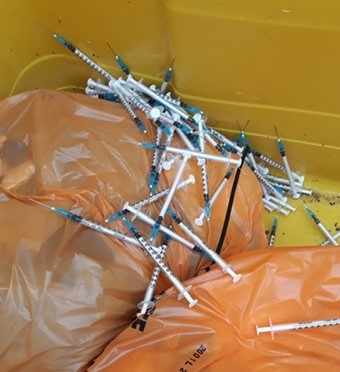Independent healthcare waste management company, Anenta, has advised the Government that the collection and disposal of waste arising from the UK-wide Covid-19 vaccination programme could face significant challenges if action is not taken to vaccinate clinical waste collection operatives.
According to Anenta, if the issue is not addressed, illness among those drivers could slow the vaccine-roll-out and have wider implications for healthcare across the UK.
‘We are close,’ says Anenta’s Managing Director, Graham Flynn, ‘to a tipping point where illness among those trained to collect healthcare and clinical waste could reach such high proportions that the collection of PPE and syringes from vaccination centres could falter, and services to the wider NHS could be seriously affected.
‘We’re already seeing record numbers of drivers calling in sick. In the last week alone, we’ve had to make alternative arrangements for fifteen per cent of all collections, both in relation to vaccination centres and the collection of healthcare waste from GPs, pharmacies and other healthcare settings. That’s only sustainable for so long, which is why the issue needs to be addressed now, without delay.’
‘If drivers are not vaccinated,’ Flynn added, ‘and continue to contract Covid-19, the collection of clinical waste could slow significantly, putting pressure on the system as long-term storage sites at vaccination centres become strained. If this occurs, that could slow the Government’s vaccination schedule. It could also lead to wider issues in terms of the delayed collection of healthcare waste from hospitals and other healthcare settings. This has to be avoided, which is why we are calling for urgent action to be taken without hesitation. A standarised, consistent approach needs to be adopted to support these vitally important individuals.
‘The consequence of ill drivers is a delay in both the delivery of replacement containers for sharps, and delays in the collection of clinical waste. If that happens and waste builds up, safe storage becomes an issue.
‘For GP surgeries administering vaccines, this has an impact on the types of services that can be delivered and could affect the delivery of clinical care on site. For vaccine centres, if safe storage is not possible, that could slow the rate at which jabs can be administered.
‘There is also a concern that more expensive contingency collection measures may become necessary, and that could cost the NHS many hundreds of thousands of pounds, all of which could be avoided through the vaccination of healthcare waste drivers.
‘The proper segregation of waste is just not happening. We have heard of numerous cases where sharps, including vaccination jabs, have been thrown loose into waste bins, or disposed of in the general clinical waste orange bags alongside PPE, as opposed to being placed in designated, hard-shell, yellow plastic sealable sharps containers.
‘As a result, sharps are loose or they pierce bags when they are collected, releasing potentially infectious particles into the environment, which can be spilt on or breathed in by collection drivers.
‘We are also encountering clinical waste bags that have been incorrectly tied, allowing contaminated air to be expelled, potentially releasing Covid-laden air and other infections onto the individuals handling them. This is why we have been calling for all clinical waste bags to be swan-neck tied with a zip tie, which prevents air from escaping.
‘The concern is that volunteers are not being properly trained. As a consequence, waste collection drivers are falling ill and calling in sick. There’s no two ways about it: this is an issue that has to be addressed.’


